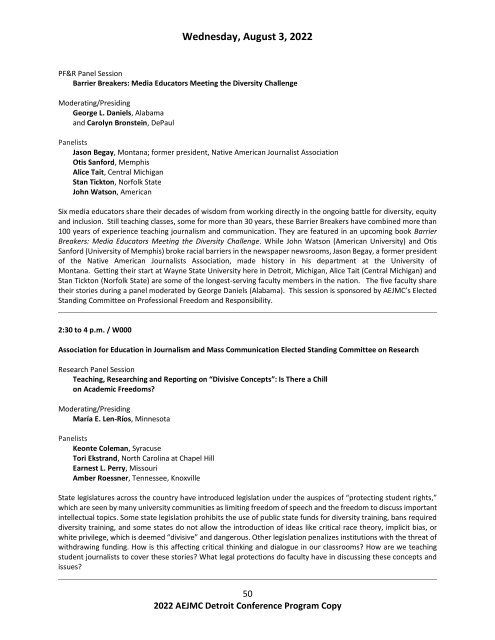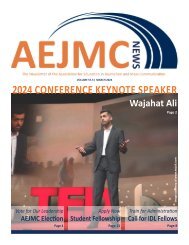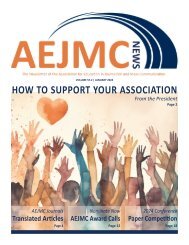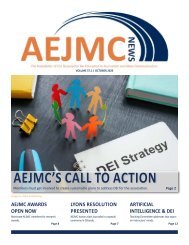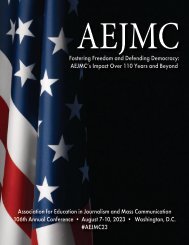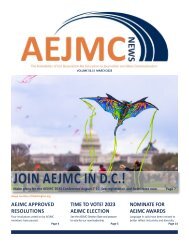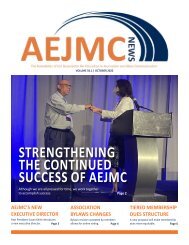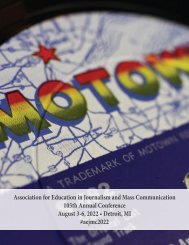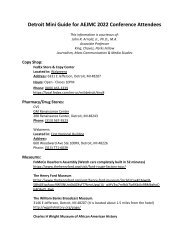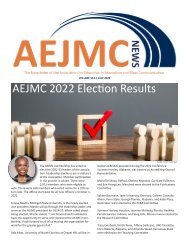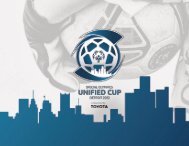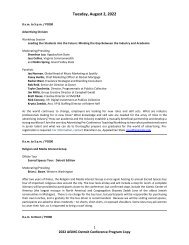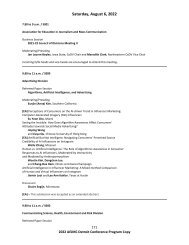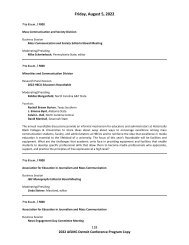22WednesdayProgramCopy_update0630
Create successful ePaper yourself
Turn your PDF publications into a flip-book with our unique Google optimized e-Paper software.
Wednesday, August 3, 2022<br />
PF&R Panel Session<br />
Barrier Breakers: Media Educators Meeting the Diversity Challenge<br />
Moderating/Presiding<br />
George L. Daniels, Alabama<br />
and Carolyn Bronstein, DePaul<br />
Panelists<br />
Jason Begay, Montana; former president, Native American Journalist Association<br />
Otis Sanford, Memphis<br />
Alice Tait, Central Michigan<br />
Stan Tickton, Norfolk State<br />
John Watson, American<br />
Six media educators share their decades of wisdom from working directly in the ongoing battle for diversity, equity<br />
and inclusion. Still teaching classes, some for more than 30 years, these Barrier Breakers have combined more than<br />
100 years of experience teaching journalism and communication. They are featured in an upcoming book Barrier<br />
Breakers: Media Educators Meeting the Diversity Challenge. While John Watson (American University) and Otis<br />
Sanford (University of Memphis) broke racial barriers in the newspaper newsrooms, Jason Begay, a former president<br />
of the Native American Journalists Association, made history in his department at the University of<br />
Montana. Getting their start at Wayne State University here in Detroit, Michigan, Alice Tait (Central Michigan) and<br />
Stan Tickton (Norfolk State) are some of the longest-serving faculty members in the nation. The five faculty share<br />
their stories during a panel moderated by George Daniels (Alabama). This session is sponsored by AEJMC’s Elected<br />
Standing Committee on Professional Freedom and Responsibility.<br />
2:30 to 4 p.m. / W000<br />
Association for Education in Journalism and Mass Communication Elected Standing Committee on Research<br />
Research Panel Session<br />
Teaching, Researching and Reporting on “Divisive Concepts”: Is There a Chill<br />
on Academic Freedoms?<br />
Moderating/Presiding<br />
María E. Len-Ríos, Minnesota<br />
Panelists<br />
Keonte Coleman, Syracuse<br />
Tori Ekstrand, North Carolina at Chapel Hill<br />
Earnest L. Perry, Missouri<br />
Amber Roessner, Tennessee, Knoxville<br />
State legislatures across the country have introduced legislation under the auspices of “protecting student rights,”<br />
which are seen by many university communities as limiting freedom of speech and the freedom to discuss important<br />
intellectual topics. Some state legislation prohibits the use of public state funds for diversity training, bans required<br />
diversity training, and some states do not allow the introduction of ideas like critical race theory, implicit bias, or<br />
white privilege, which is deemed “divisive” and dangerous. Other legislation penalizes institutions with the threat of<br />
withdrawing funding. How is this affecting critical thinking and dialogue in our classrooms? How are we teaching<br />
student journalists to cover these stories? What legal protections do faculty have in discussing these concepts and<br />
issues?<br />
50<br />
2022 AEJMC Detroit Conference Program Copy


